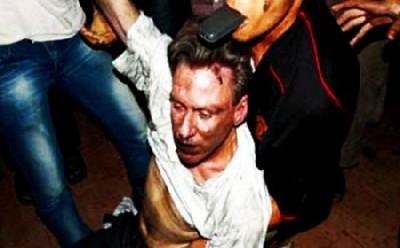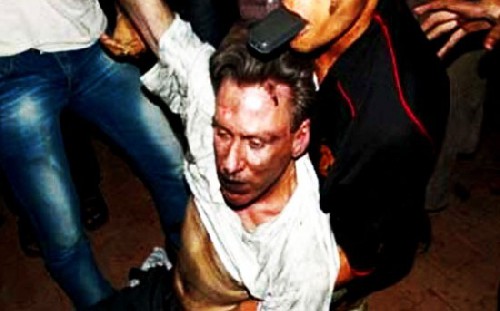 In a secret raid Sunday, U.S. special operations troops captured the suspected ringleader of the 2012 attack against two American government facilities in Benghazi, Libya, putting a key figure in the deadly assault in U.S. hands for the first time, U.S. officials said Tuesday.
In a secret raid Sunday, U.S. special operations troops captured the suspected ringleader of the 2012 attack against two American government facilities in Benghazi, Libya, putting a key figure in the deadly assault in U.S. hands for the first time, U.S. officials said Tuesday.
Ahmed Abu Khatallah was captured near Benghazi by U.S. troops working with the FBI, and was taken to an undisclosed location outside Libya, the Pentagon said in a statement that described him as “a key figure in the attacks on U.S. facilities in Benghazi.”
There were no casualties in the raid and all U.S. personnel have left Libya, the statement said.
President Obama, in statement, said the capture “demonstrated that we will do whatever it takes to see that justice is done when people harm Americans.”
Obama said the U.S. also remained committed to supporting the Libyan people “as they work to overcome years of tyranny and do the difficult work of building a democracy.”
Khatallah’s capture is a major success for the Obama administration, which has faced a steady drumbeat of criticism from Republicans since the Benghazi attacks for failing to capture the perpetrators and for poor security at a U.S. diplomatic compound and a CIA base nearby.
Four Americans, including U.S. Ambassador J. Christopher Stevens, were killed that night when more than 60 attackers overwhelmed unarmed Libyan guards and stormed the compound, setting fire to the buildings and engaging in running gun battles with a few CIA and diplomatic security agents.
The Justice Department has issued a sealed indictment of Khattalah, officials have said, but the FBI investigation of the incident was stalled for months by instability in Libya. The country’s weak government ruled out extraditing its citizens to the U.S.
Until his capture, Khatallah continued to live freely in Libya while giving taunting interviews to major media outlets as recently as six months ago. The State Department designated Khattalah as a terrorist in January, describing him as a leader of Ansar al Sharia, a Libyan militant group that has been described as having links to al Qaeda.
Benghazi, the hub of Libya’s east, has been beset by turmoil in recent months, and the chaos deepened last month when a rogue ex-general based in the city launched a self-declared war on Islamist armed groups, resulting in more than 100 deaths.
Khalifa Hiftar, who spent years in exile in the United States, has the support of some Libyan military units, and has used military aircraft to bombard the positions of Islamist militias. Even before Haftar’s offensive, assassinations and car bombings were common in Benghazi, most often taking aim at security targets.
This week, authorities ordered an overnight ban on vehicle traffic in the city in an effort to stem militia clashes that had been breaking out nightly as soon as darkness fell.
The circumstances surrounding the September 2012 Benghazi attack sparked a long-running partisan battle. A report earlier this year by House Republicans blamed the Obama administration for failing to beef up security.
But the same report debunked persistent claims about the response to the incident: that the U.S. military was ordered to “stand down” instead of going to the aid Stevens and others.
“There was no ‘stand down’ order issued to U.S. military personnel in Tripoli,” the report said, blaming the claim on “confusion” about the facts arising from what it termed inadequate previous reviews.
Hillary Rodham Clinton, who was secretary of State at the time of the attack, has said repeatedly that she was responsible for the security of the diplomats in Benghazi.
On Sunday, questioned again about her role, she suggested that no additional explanation she offered would satisfy her critics.
“There’s a difference between unanswered questions and unlistened to answers,” Clinton told Jane Pauley in an interview on “CBS Sunday Morning.”
“There were a lot of confusing pieces of information flooding into us from the very first moment we heard about it,” Clinton said, referring to the attack on the U.S. diplomatic compound in Benghazi. “We did our best to sort it out.”
“I did my best to fully cooperate with the Congress. I respect the Congress’ oversight responsibility,” she added, but suggested that Republican critics have seized on discrepancies that arose from “the fog of war” and have improperly tried to use them as evidence of a coverup.
LA Times


Leave a Reply
You must be logged in to post a comment.